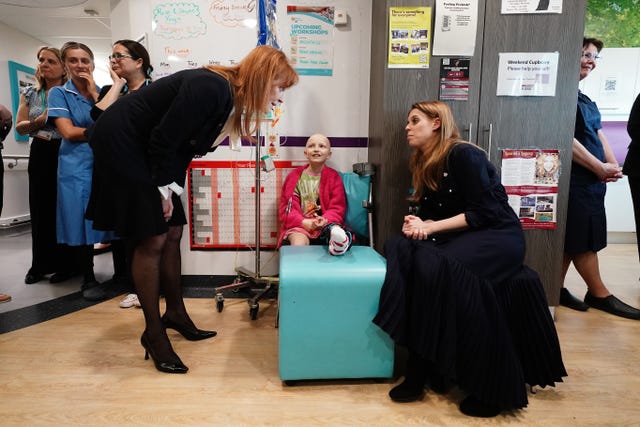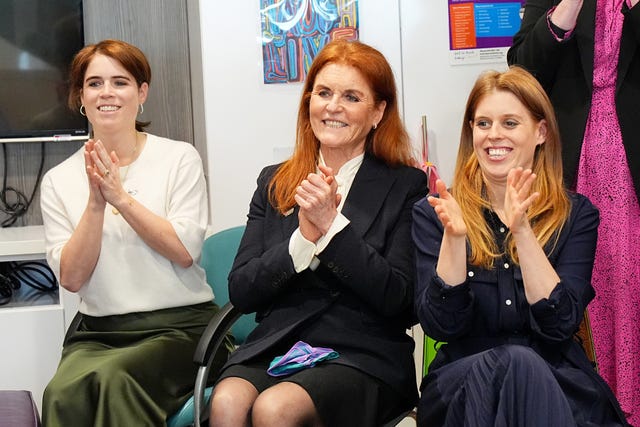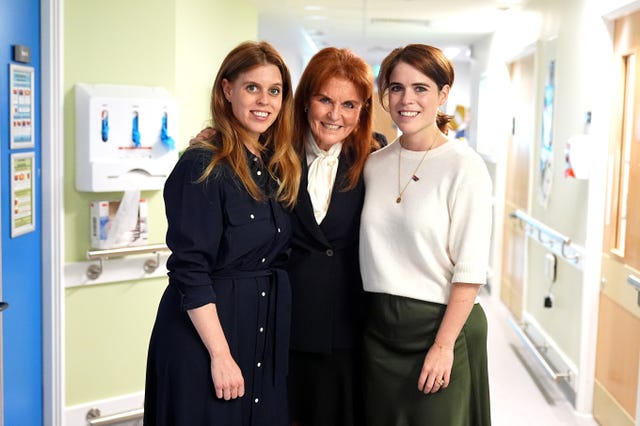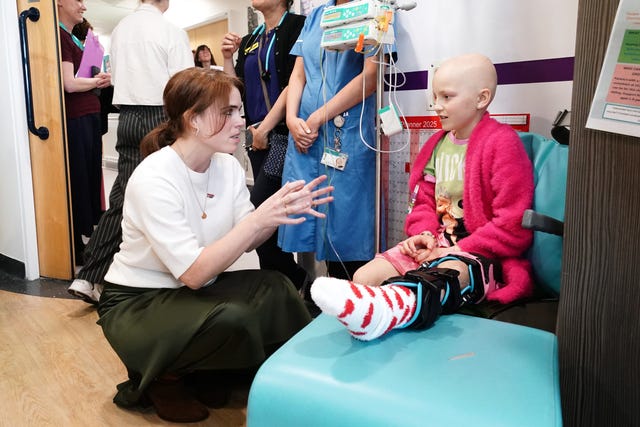Duchess of York visits young cancer patients in hospital
The duchess, along with her daughters Princess Beatrice and Princess Eugenie, visited the the University College Hospital in London on Wednesday.

Sarah, Duchess of York, visited young people with cancer in hospital as she called on the Government to provide more support for teenagers with the disease.
The ex-wife of the Duke of York, along with her two daughters Princess Beatrice and Princess Eugenie, visited the Teenage Cancer Trust unit at the University College Hospital in London on Wednesday where they met young patients.
The visit comes as the duchess signed an open letter to Health Secretary Wes Streeting calling for faster diagnoses, better access to clinical trials and improved mental health support for young people with cancer.

Writing in The Times, the duchess, who has been diagnosed with the disease twice, said health policies which fail to take teenagers with the disease into account can have “devastating” and “tragic” consequences.
During the visit, the trio met patients as well as NHS nurses and youth workers who are supporting young people through their cancer treatment.
Among them was Lennon Pearson, 18, who was diagnosed with lymphoma in January.
Mr Pearson, from Witham in Essex, said: “I had been feeling unwell for months, so my GP ordered a blood test.
“The next day I was rushed to hospital, and I’m starting my fourth cycle of chemo here tomorrow.
“You don’t meet royalty every day and it’s good that they are visiting to raise awareness.
“There’s a lot of negativity around cancer so trying to stay as positive as you can is important.”

The duchess, who opened the hospital unit in 2005 and has been patron of the Teenage Cancer Trust for 35 years, said in a statement that meeting young people with cancer was “always an incredibly moving experience”.
She said: “It’s incredibly important to me to try to amplify the voices and experiences of people with cancer who receive less attention, whose voices are not listened to and who can be overlooked.
“The young people receiving care on this unit and their parents are currently under tremendous stress and worry, but I take heart in knowing that the unit and the incredible team working here can provide comfort, care and hope.”
Beatrice reflected on a previous visit to the hospital, saying it had a “huge impact” on her.
“Sadly, cancer doesn’t care if you’re young or old and touches so many families in some way,” she said.
“I remember my mother bringing me to this very hospital on my 18th birthday to learn more about Teenage Cancer Trust’s work supporting young people, and it had such a huge impact on me.
“To be here again today and meet with young people and their families who are facing such huge challenges is a privilege and an honour.
“Their resilience in the face of adversity never ceases to amaze.”

Eugenie praised the staff at the hospital, calling them “absolute heroes”.
“Nobody ever wants to find themselves in hospital, but for young people with cancer and their families, units like these – bright welcoming spaces with amazing staff – truly are the best possible place”, she said.
According to the Teenage Cancer Trust, seven people aged 13 to 24 in the UK are told they have cancer every day.
In the article in The Times, Sarah backed the charity’s campaign #AndYoungPeople and called for teenagers to be considered in the national cancer plan for England.
She reflected on her own double diagnosis, first with breast cancer in 2023 and then skin cancer in 2024.
The duchess wrote: “I have gone through two diagnoses. It’s incredibly important to me to seek to amplify the voices and experiences of people with cancer who receive less attention, whose voices are not listened to and who can be overlooked.
“One group consistently neglected by those developing health plans and policies is teenagers and young adults with cancer.
“The impact can be devastating.”

Of young patients, she added: “As most cases of cancer occur in people over 50, they find themselves in a system that isn’t designed with young people in mind and continue to suffer huge disadvantages.”
She also told of speaking to teenagers who had been “fobbed” off by health professionals despite presenting multiple symptoms, adding: “The consequences can be tragic.”
The Department of Health and Social Care launched a call for evidence to help shape a national cancer plan in February.
The blueprint, which is expected later this year, will aim to transform cancer care by improving diagnosis, screening and treatment, as well as bolstering research and looking at ways to help prevent the disease.





